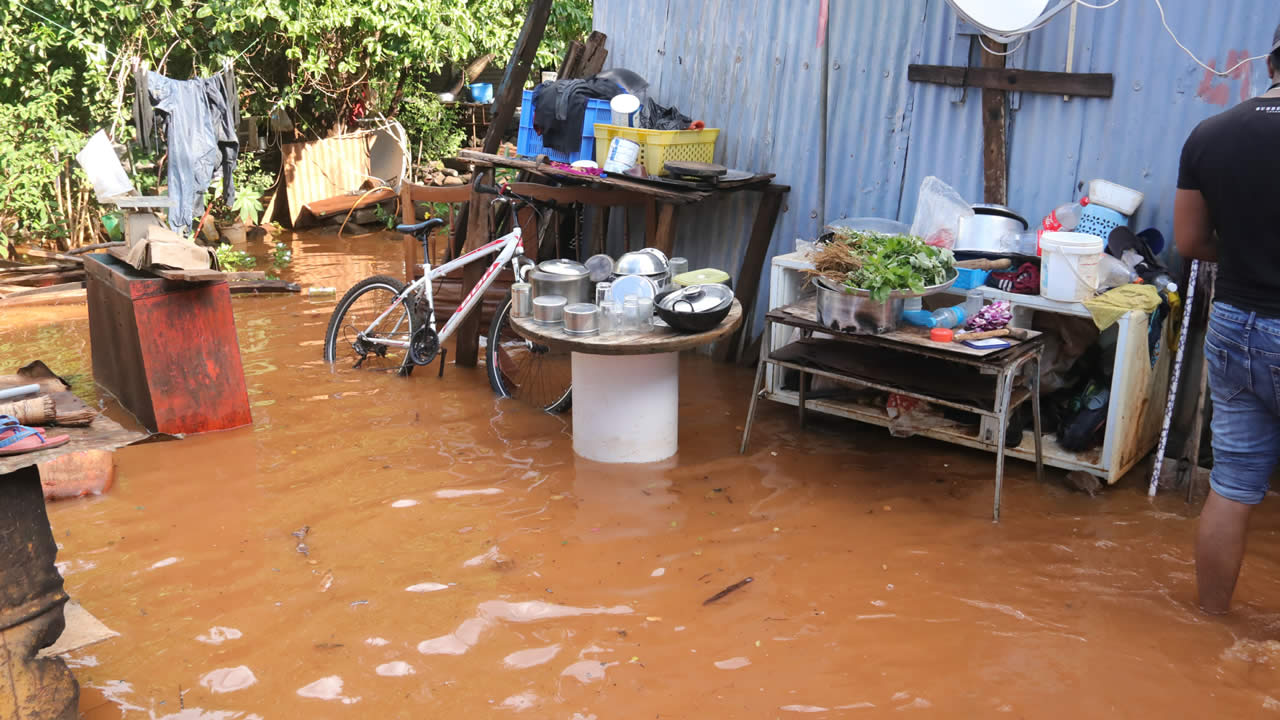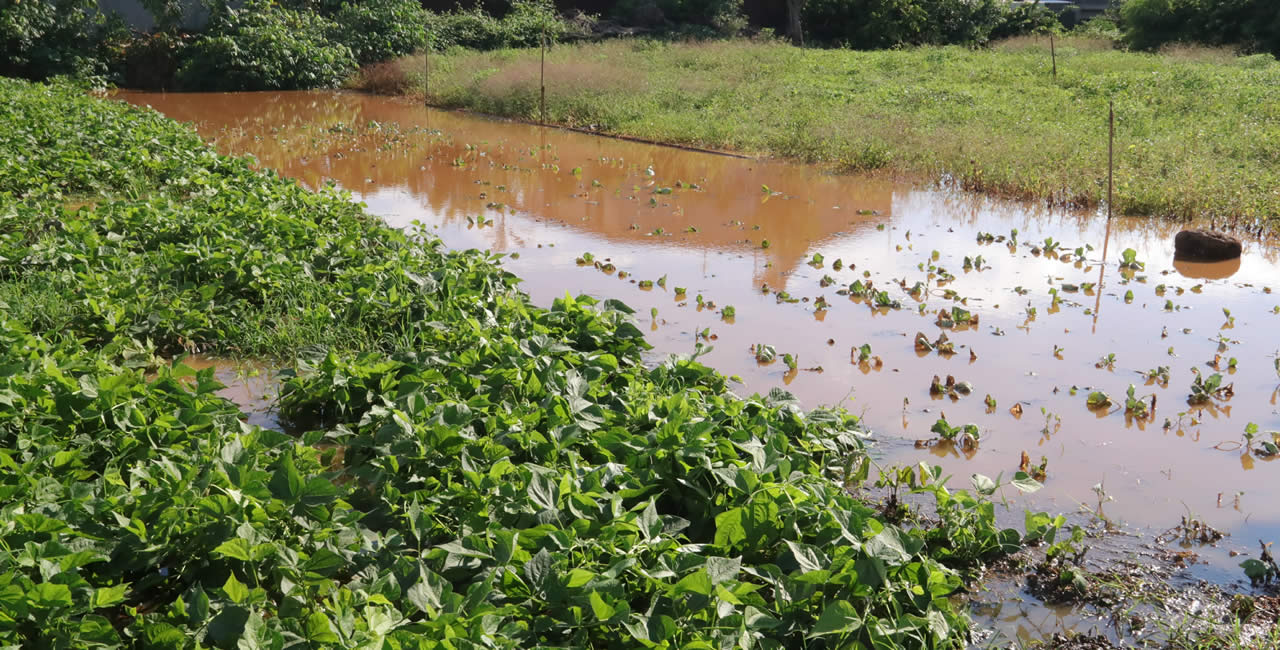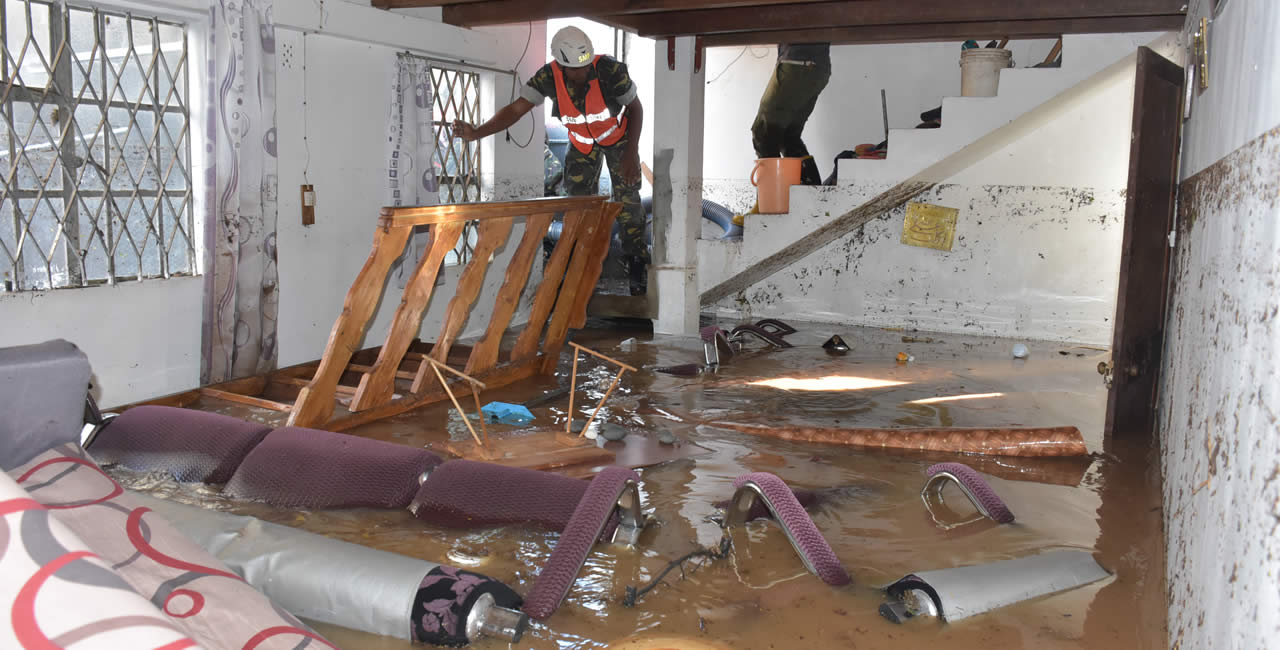
Flash floods, water accumulation and high temperature have become major concerns for Mauritius. Over the past few years, we have constantly witnessed flash floods, which brought us to our knees. Millions of rupees are being disbursed by the Government to help people affected by floods and to repair infrastructures. These kinds of extreme weather changes are putting a burden on the country’s economy.
 According to the Intergovernmental Panel on Climate Change (IPCC) 4th Assessment Report, climate is bound to impact Small Island Developing States (SIDS) and Mauritius is not being spared either. Mauritius is poised to take a powerful economic hit from climate change in the coming days. Dr Girish Bekaroo reveals that as a Small Island Developing State (SIDS), Mauritius inherently has a fragile environment and is very susceptible to the effects of climate change, even though it is among the least contributors to greenhouse gases. “It has been predicted that the climate will inevitably further alter in the coming decades, causing a number of adverse impacts on livelihood, changing the environment and impairing the economy. Today, a number of scientists are working on how to cope with this phenomenon and Mauritius needs to progressively adapt to the negative impacts of climate change.”
According to the Intergovernmental Panel on Climate Change (IPCC) 4th Assessment Report, climate is bound to impact Small Island Developing States (SIDS) and Mauritius is not being spared either. Mauritius is poised to take a powerful economic hit from climate change in the coming days. Dr Girish Bekaroo reveals that as a Small Island Developing State (SIDS), Mauritius inherently has a fragile environment and is very susceptible to the effects of climate change, even though it is among the least contributors to greenhouse gases. “It has been predicted that the climate will inevitably further alter in the coming decades, causing a number of adverse impacts on livelihood, changing the environment and impairing the economy. Today, a number of scientists are working on how to cope with this phenomenon and Mauritius needs to progressively adapt to the negative impacts of climate change.”
Amruta Sagar Mudhole, Environmentalist, argues that the effects of climate change are already shaking up social, health and geopolitical balances in many parts of the world. “The scarcity of resources like food and energy gives rise to new conflicts due to competition and erratic price variations of the products of basic need such as staples, vegetables and fruits. Different places experience the climate crisis differently. Most of the island nations such as Mauritius are especially vulnerable to rising sea levels and all the devastation that comes with them. Climate change represents the single greatest threat to the livelihoods of the people living on low-lying, vulnerable countries, Mauritius being one of them.”
 Economic impact
Economic impact
It is highly debated that extreme weather events could cost the country hundreds of billions of rupees in lost labor, reduced crop yields, health problems and crumbling infrastructure. Several sectors of Mauritius ranging from tourism to human health and infrastructure have been severely affected over the past years due to climate change. Dr Bekaroo states that throughout the past decade, there have been recurring flash floods during almost every summer and these have caused significant damage to infrastructure, plantations, livestock and property of many Mauritian families at different locations within the island. Consequently, the economy of the island is adversely impacted.
The Government has had to disburse several millions of rupees in the form of allowance for flood victims and to re-build infrastructure, among other expenses – these funds could have been used for further development of different sectors of the economy. As at the 18th April 2019, the Social Security had disbursed a sum of Rs1,383,558 as flood allowance of Rs182 each to victims affected by torrential rain all across the island of Mauritius for the period 9th and 10th February 2019 and on the 9th, 10th, 11th and 14th April 2019. Moreover, it has been seen that due to uncertain climatic conditions, the Government has amended the Regulations of the Prime Minister’s Relief Fund to make provision for the payment of compensation to the victims of floods, cyclones and other calamities. Under this fund, assistance is provided to those who have suffered severe structural damages and consequential material lost has been incurred. A sum of Rs6,000 are then paid to each adult and every child under the age of 18 receives Rs3,000 in each household. This assistance is to provide relief to the affected family or household over a period of time to enable it to find its footings. As 22nd April 2019 at 16:00 hours, an amount of Rs21,130,000 had been paid from the Prime Minister’s Relief Fund to the victims of the torrential rain events of 9th and 10th February 2019 and of 9th, 10th, 11th and 14th April 2019. Different regions in Mauritius have been victims of recent floods. For example, in Fond Du Sac, 103 households were severely affected and Government had to disburse Rs1,836,000. In Pamplemousses for 123 households affected, the sum of Rs1,998,000 had to be spent. At Pointe aux Sables, 139 households were affected and Rs2,397,000 were disbursed.
 Agriculture : planters lost 25 to 30% of their investment
Agriculture : planters lost 25 to 30% of their investment
Kreepalloo Sunghoon, secretary of the Small Planters Association, reveals that the agriculture sector is the most affected by climate change. “We have been severely affected by flash floods and change in climate. We belong to a sector that is highly dependent on climate. Because of high temperature, plants die at the very initial stage itself. We have also observed a decrease in the pollination process. The bee population has decreased as well. Increasing temperature leads to decrease in productivity as well.”
He further adds that due to flash floods, most planters have lost their plantations and their situation is affecting the whole country. “If the price of some vegetables is high, it is because planters have lost what they have invested. 25 to 30% lost in investment has been incurred by planters recently. We are also aware that the effects of climate change are inevitable but we have to prepare ourselves.” He recommends the Government to come forward with protected structure to help the agriculture sector.
Coastal Resources and Tourism : beaches shrunk by 20 metres
Amruta Sagar Mudhole highlights that tourism and the hotel industry are the major contributors of the economy in Mauritius. “It is of utmost importance that we should be concerned about climate change. People all over the world visit Mauritius for its beaches, weather and the reefs which are all at risk due to the climate change. The steady rise in the sea surface temperatures are causing bleaching of reefs and eventually dying of the reefs. Australia has already lost its natural wonder of the world, The Great Barrier Reef, attributed to this climate change. Mauritius being a small island nation cannot afford to lose its reefs or beaches.”
According to UNDP, beaches in Mauritius have shrunk by as much as 20 meters over the last few decades due to higher seas and weakened coral ecosystems. The Government indicates the connected loss of tourism to the beaches here could cost over US$100 million (Rs3.6 billions) per year by 2060 if nothing is done.
Ajay Aubeelauck, spokesperson of owners of bungalows, confides that the recent floods have caused serious damages in the region of the north. He indicates that bungalow owners suffered a loss of 60%. “With accumulation of water during the summer, which is the peak period here, we have lost many clients. Tourists do not want to stay in a region where water accumulates. Most of them prefer not to come again or even recommend others to come. If this situation persists, we will incur loss of millions of rupees yearly.”
He reveals that not only bungalows owners are facing this situation but, restaurants and shops in the nearby region are also suffering. “Many shops and restaurants are not working as they should. Most of them are downsizing their businesses.”

Infrastructure
Our properties, buildings and roads have been affected or damaged due to flooding, erosion and landslide. The Government has to spend millions on the construction of drains and its maintenance. In 2014, Mauritius Port’s operations were suspended for 10 days in 2014 due to adverse weather conditions leading to a loss of USD 54 million (Rs1.9 billion). Besides, during the current financial year, an amount of Rs45 m. has been allocated to the Local Authorities for the cleaning and maintenance of drains, rivers and canals.
Action required
Dr Bekaroo recalls that since Mauritius is highly vulnerable to the impacts of climate change, which are also becoming increasingly visible, progressive adaptation is needed. “Adjustments are needed temporally and spatially in order to lower the risks posed by different impacts of climate change. For some of them, adaptation measures should have already been taken and due to the lack of implemented measures, consequences have been terrible. In the short term, immediate responses are needed for adaptation to the most visible extreme weather events and for example, for recurring torrential rainfall and flash floods, key measures urgently needed include structural flood protection measures and early warning systems, among others.”
In the medium and longer term, although the National Climate Change Adaptation Policy Framework has been previously formulated, more research is needed to quantitatively assess and project how each impact of climate change will temporally affect different sectors of the Mauritian economy so that more effective frameworks, strategies and policies are devised to prioritize actions to be taken in the future, he adds.
Amruta Sagar Mudhole puts forward that businesses have a responsibility to reduce their contribution to climate change. “Businesses should be encouraged to set and meet goals to reduce carbon emissions, advance projects to protect their resources from climate impacts, and ensure the sustainability of their core business. Government must play a central role to tackle the climate crisis. They should work to advance policies that reduce carbon pollution, support clean energy technologies, prepare for the effects of climate change, and curb deforestation.”

Household in danger
Along with businesses and the economy as a whole, various households across the country have been affected. Many homes have witnessed terrible loss of personal belongings. The recent flood had a great impact on the village of Fond du Sac. According to the Village Councillor, Yash Ramchurn, it is the fourth time the village is witnessing dreadful floods damaging many houses. He reveals that this time, 15 houses have lost everything. “The elapse of time the flood occurred is not too long. Recently, the households recovered from a flood which had put a debt burden on the members of the family and now they have been victims of another flood. It is not easy for them to recover.”
He argues that the people received a lot of donations but still, it is hard for them to renovate again. “The families are living in fear. They cannot take more loans and be indebted. They do not have the means to rebuild. Some people are finding it difficult to take leave from work. It is really stressful for them. Besides, after the flood, the condition they are living in is not healthy at all. There is a foul stench prevailing around. Along with material lost, health also is at risk.”
The same picture can be seen at Baie du Tombeau. Cindy, a mother of eight children, has been a victim of floods for four years in a row. “As from her first time as a flood victim, she has not been able to get her life back on track. Every time there is heavy rain, water accumulation destroys everything. From appliances to school materials, everything is lost. We get help from people but still we are suffering. It is very difficult to live in constant fear.”
 Trade and SMEs 80% of traders suffered
Trade and SMEs 80% of traders suffered
Raj Appadu explains that all the governments have failed to prepare the country to face climate change so far. “Unfortunately, we are facing a real crisis. Almost 80% of traders have suffered due to flash floods and accumulation of water. Some businesses have lost all their investment in a just a few hours and they did not have any other choice than to pack up and leave. Others have to renovate and invest more in the business.”
He believes that the time has come for the Government to take into consideration the impact of climate change seriously. “If this continues, many shops will have to close down. They will not have any choice left.”
Human Health
In relation to the health sector, Dr Bekaroo states that climate change negatively affects human health directly, for example effects of thermal stress or indirectly, for instance through pollution or mosquito borne diseases. He adds that people who are also exposed to extreme heat are more vulnerable to respiratory and cardiovascular diseases, among others.
Moreover, an increase in frequency of vector borne diseases, particularly dengue, linked to variabilities in temperature, has been observed. So, the Government has to carry the burden of cost health.
 J'aime
J'aime














